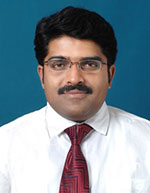
Electronics, Communications and Networks


Biography: Dr Rudraswamy S B received B.E. degree in electronics and communication from Kuvempu University, Karnataka, India, in 2002, M.Tech. degree in VLSI design and embedded system from (SJCE) VTU, Karnataka, India in 2006 and the Ph.D. degree in microelectronics and nanotechnology from the Indian Institute of Science, Bangalore, India, in 2015. He is currently an Associate Professor with the Department of Electronics and Communication Engineering, Sri Jayachamarajendra College of Engineering, Mysuru, JSS Science and Technology University, Karnataka, India. He is the recipient of 'Commonwealth Fellowship award' from Commonwealth Secretariat, United Kingdom for the year 2016-17. He is a Visiting Academic to School of Materials, University of Manchester, UK between January 2017- April 2017 under the commonwealth fellowship. He was a Visiting scientist/Professor to NJIT, New Jersey’s Science and Technology University, New Jersey, United States of America between June 2016- August 2016. Prof Rudraswamy S B is a recipient of the ‘Best doctoral Thesis Award’ from the Board for IT Education Standards, Government of Karnataka and two more best doctoral thesis award elsewhere. He has got ‘Best technical paper award’ and ‘Best technical poster Award’ in an International conference and in a research symposium, Indian Institute of Science, Bangalore. Published technical papers in National and International Journals and conferences. Presented technical talks in many International conferences and visited countries such as France, Germany, Switzerland, Poland and Australia to deliver technical talks. He is a member of many societies such as IEEE, ISSS, and IETE. Delivered technical talks at various Engineering and Polytechnic colleges across India.
Speech Title: Design, fabrication and development of metal oxide semiconductor based gas sensor system for CO2 monitoring
Abstract: Humanity's fossil fuel (e.g. coal, petroleum) emissions in the industrial era and large-scale modification of the landscape (e.g. conversion of forests to croplands) in the past several millennia have resulted in abrupt rise in CO2 concentration in the planet. In the recent decade, fossil fuel emissions and land cover change have contributed approximately 90% and 10% to total CO2 emissions respectively. In addition, CO2 absorbs infrared radiation emitted by the planet and hence has a tendency to increase the heat content and temperature of the planet. In the recent years, humanity's CO2 emissions have averaged at about 10 billion tons of carbon per year. Out of this, 50% has stayed in the atmosphere and terrestrial plants and oceans have removed the other half. Hence, the atmospheric loading of carbon is increasing at about 5 billion tons of carbon or 2.5 ppm of CO2 per year. With the proliferation of industries worldwide and more automobile usage, there is a growing need and interest in sensing and monitoring environmental pollutants and monitoring the concentration of chemicals/gases in industrial process control. Hence, Chemical/Gas sensing is an important requirement in environmental pollution monitoring especially for CO2 gas. Talk focuses on the design and development of a metal-oxide based gas sensor system. Metal oxide semiconductor gas sensors represent a remarkable application of modern nanotechnologies and complex physico-chemical processes. These devices transduce a chemical quantity, such as a gas concentration, into an electric signal. Miniaturization of the device dimension coupled with the application of micro and nano fabrication processes and the use of low-cost thin film deposition technique, along with the use of a low-power sensor interface has resulted in a low-cost, low power sensor implementation.